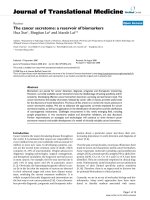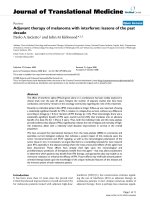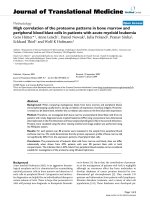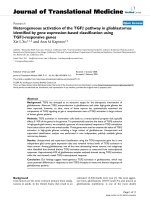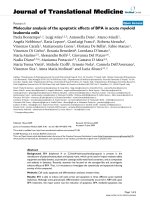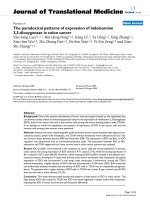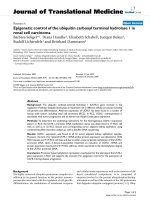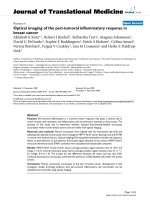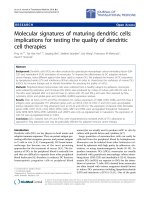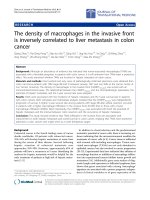báo cáo hóa học:" The role of multidisciplinary research and collaboration for improving the resilience of communities to volcanic risk Professor David Johnston" ppt
Bạn đang xem bản rút gọn của tài liệu. Xem và tải ngay bản đầy đủ của tài liệu tại đây (123.11 KB, 1 trang )
EDI T O R I A L Open Access
The role of multidisciplinary research and
collaboration for improving the resilience of
communities to volcanic risk
Professor David Johnston
Significant portions of the world’s population are at risk
from the impacts of volcanic activity. While the timing of
eruptions may be unknown or uncertain, their impacts
and long term effects can be assessed. Recent eruptions
have demonstrated the devastating impacts of volcanic
activity on nearby landscapes and communities. The
2010 Eyjafjallajökull eruptions, although small by world
standards, highlighted the vulnerability of the modern
day global society to minor eruptions. Volcanic crises
must be planned for using a comprehensive risk manage-
ment approach that links mitigation, preparedness,
response and recovery activities. Over the last few dec-
ades it has been recognized that integrated multi-disci-
plinary research is needed to provide an understanding of
the social, economic and cultural facto rs that influence
the development of strong communities that are resilient
to the impacts of volcano hazards and able to respond
effectively when events occur.
A number of global initiatives are seeking to promote
these concepts. The Integrated Research for Disaster
Reduction (IRDR) is a
decade-long integrated research program co-sponsored by
the International Council for Science (ICSU), the Interna-
tional Social Science Council (ISSC), and the United
Nations International Strategy for Disaster Reduction
(UN-ISDR). It is a global, multi-disciplinary approach to
dealing with the challenges brought about by natural dis-
asters, mitigating their impacts, and improving related pol-
icy-making mechanisms. The IRDR Program endeavors to
bring together the natural, socio-economic, health and
engineering sciences in a coordinated effort to reduce the
risks associated with natural hazards.
The International Association of Volcanology and
Chemistry of the Earth’sInterior(IAVCEI)hasanum-
ber of commissions working towards reducing volcanic
risk. The Cities and Volcanoes Commission http://cav.
volcano.info/ aims to provide a linkage between the vol-
canology community and emerge ncy managers, to serve
asaconduitforexchangeofideasandexperience
between “volcano cities ”, and promote multi-disciplinary
applied researc h, involving the collaboration of physical
and social scientists and city officials. The Commission
also aims to develop a close link with the International
Volcanic Health Hazard Network (IVHHN) and the
World Organization of Volcano Observatories (WOVO).
This new journal also aims to play its part in support-
ing multi-disciplinary research and collaboration for
improving the resilience of communities to volcanic risk.
Received: 20 December 2011 Accepted: 25 January 2012
Published: 25 January 2012
doi:10.1186/2191-5040-1-1
Cite this article as: Johnston: The role of multidisciplinary research and
collaboration for improving the resilience of communities to volcanic
risk. Journal of Applied Volcanology 2012 1:1.
Submit your manuscript to a
journal and benefi t from:
7 Convenient online submission
7 Rigorous peer review
7 Immediate publication on acceptance
7 Open access: articles freely available online
7 High visibility within the fi eld
7 Retaining the copyright to your article
Submit your next manuscript at 7 springeropen.com
Correspondence:
Joint Centre for Disaster Research, GNS Science/Massey University, PO Box
30368, Lower Hutt, 5040, New Zealand
Johnston Journal of Applied Volcanology 2012, 1:1
/>© 2012 Johnston et al; licensee Springer. This is an Open Access article distributed under the terms of the Creative Commons
Attribution License ( which permits unrestricted use, distribution, and reproduct ion in
any medium, provided the original work is properly cited.
